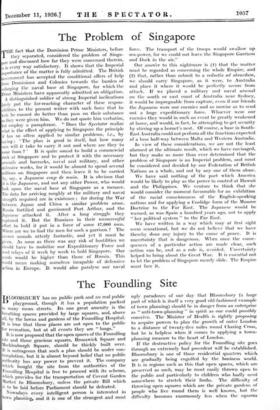The Problem of Singapore
HE fact that the Dominion Prime Ministers, before they separated, considered the problem of Singa- re and discussed how far they were concerned therein, is in every way satisfactory. It shows that the Imperial importance of the matter is fully admitted. The British Government has accepted the conditional offers of help nom Dominions and Colonies towards the burden of enlarging the naval base at Singapore, for which the rime Ministers have apparently admitted an obligation.
A distinguished soldier of strong Imperial inclinations tely put the far-reaching character of these respon- sibilities to the present writer with such force that he feels he cannot do better than pass on their substance as they were given him. We do not quote him verbatim, but employ a paraphrase. " Does the Spectator realize what is the effect of applying to Singapore the principle it has so often applied to similar problems, i.e., by saying : ' The plan is good in itself, but how many men will it take to carry it out and where are they to me from ? ' It is quite sound to build a commercial dock at Singapore and to protect it with the necessary rsenals and barracks, naval and military, and other lefensive works, for it would be absurd to spend several millions on Singapore and then -leave it to be carried by, say, a Japanese coup de main. It is obvious that it is the Japanese, and not any other Power, who would ook upon the naval base at Singapore as a menace. The data for arriving roughly at the military and naval strength required are in existence ; for during the War between Japan and China a similar problem arose. Russia fortified and garrisoned Port Arthur, and the Japanese attacked it. After a long struggle they aptured it. But the Russians in their unsuccessful ffort to hold it put in a force of some 47,000 men. Vhere are we to find the men for such a garrison ? The answer sounds utterly fantastic, and yet it must be qwen. As soon as there was any risk of hostilities we hottld have to mobilize our Expeditionary Force and end relays of it week by week to hold Singapore. Our needs would . be higher than those of Russia. This could mean making ourselves incapable of defensive action in Europe. It would also paralyse our naval force. The transport of the troops would swallow up sea-power, for we could not leave the Singapore Garrison and Dock in the air."
Our answer to this nightmare is (1) that the matter must be regarded as concerning the whole Empire, and (2) that, rather than submit to a reductio ad absurdum, we should carry Singapore, as it were, to Australia and place it where it would be perfectly secure from attack. If we placed a military and naval arsenal on the south or east coast of Australia near Sydney, it would be impregnable from capture, even if our friends the Japanese. were our. enemies and so unwise as to send out a huge expeditionary force. Whoever were our enemies they would in such an event be greatly weakened at home, and would, in fact, be attempting to get security by stirring up a hornet's nest. Of course, a base in South- East Australia could not perform all the functions expected of a base half-way between Malta and Western Australia.
In view of these considerations, we are not the least alarmed at the ultimate result, which we have envisaged, but they make us more than ever determined that the problem of Singapore is an Imperial problem, and must be considered and decided by our Federation of British Nations as a whole, and not by any one of them alone.
We have said nothing of the part which America would be likely to play as the power in control at Hawaii and the Philippines. We venture to think that she would consider the moment favourable for an exhibition of the racial consciousness of the English-speaking nations and for applying a Coolidge form of the Munroe Doctrine to the Far East. The Japanese would be warned, as was Spain a hundred years ago, not to apply " her political system " to the Far East.
We have written in a way which may at first sight seem sensational, but we do not believe that we have thereby done any injury to the cause of peace. It is uncertainty that is dangerous. When once the conse- quences of a particular action arc made clear, such • action can be, and as a rule is, avoided. Uncertainty helped to bring about the Great War. It is essential not to let the problem of Singapore merely slide. The Empire must face it.














































 Previous page
Previous page